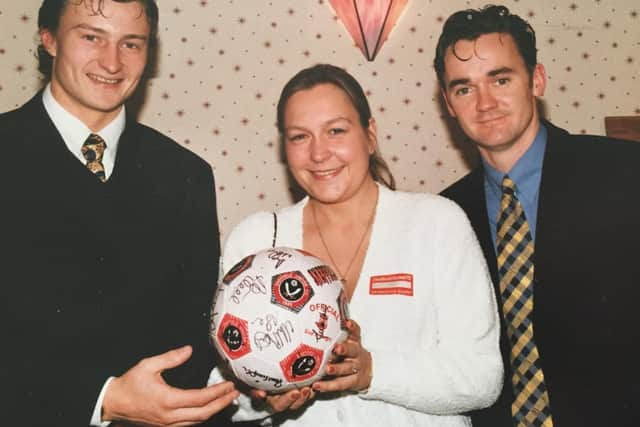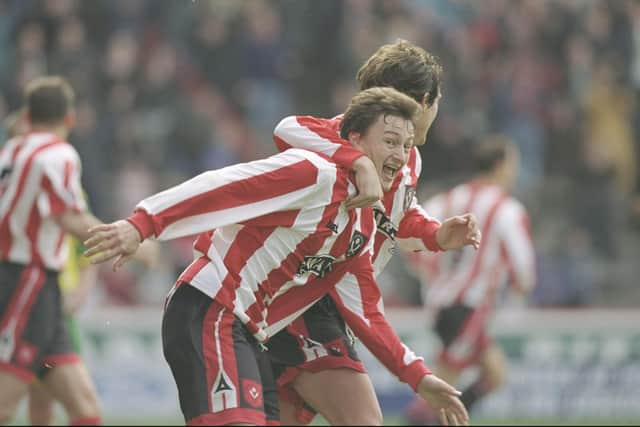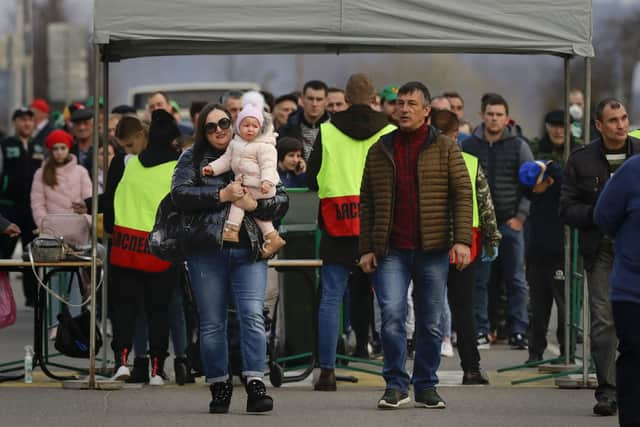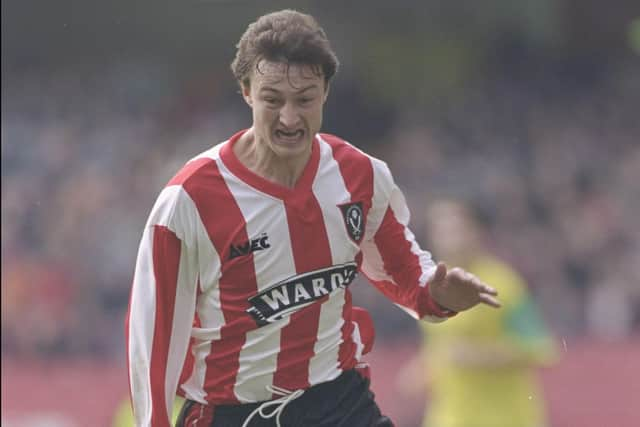Petr Katchouro on his love for Sheffield United, respect for Chris Wilder and Belarusian football's new-found popularity in England
and live on Freeview channel 276
While competition across the rest of the world grinds inexorably to a halt, supporters starved of their weekly fix are now familiarising themselves with the likes of BATE Borisov and Dinamo Minsk as the Vysshaya Liga ploughs doggedly on through the pandemic.
“It is better to die standing on your feet than to live on your knees,” Lukashenko told reporters at an event last weekend, having previously labelled social distancing measures as “frenzy and psychosis.”
Advertisement
Hide AdAdvertisement
Hide AdPyotr Kachura, or Petr Katchouro as he was better known during his time in England, is pleased to discover his homeland’s top-flight teams are now gaining global exposure. Even though, he stresses several times, the circumstances are unfortunate.
But Katchouro is not on the line to discuss Covid-19 or the most appropriate response to the crisis. He has telephoned, after a brief exchange via WhatApp, to talk about Sheffield United.
“I still watch every game on television,” Katchouro says, from his home in Minsk, the republic’s capital city. “It is brilliant to see they are doing so well and, like the fans I am sure, I love their style of football.”
Katchouro spent four years in South Yorkshire, making over 100 appearances for United and reaching the First Division play-off final before leaving following the turn of the new millennium. It proved to be a life-changing journey, exposing him to a new culture, a new language and new systems and strategies. Despite, Katchouro remembers, being one he had neither planned nor sought.
Advertisement
Hide AdAdvertisement
Hide Ad“It’s a fantastic story really,” the former centre-forward laughs. “I always say no that God, he must have helped me.


“When the USSR split, Dinamo Minsk remained a very big club with very big traditions. I was playing for them, as a young man, but the level of football was starting to go down.
“We’d had a game in a small city, I can’t honestly recall where now, but I do know that I scored the only goal of the match. Then afterwards, the director told me that there were some English people who wanted to speak to me. They were from Sheffield United and they said they’d like me to come to England. I couldn’t believe it. I told them ‘I’ll go with you right now, in my shirt, shorts and boots.’ But of course there were things that needed to be arranged first.”
When Katchouro did make the trip west, he arrived at a club with very different ambitions to the one which, until the fixture calendar was suspended, had been gathering momentum in its quest for Europe and on the cusp of the Premier League’s top six. Howard Kendall, the man responsible for signing him, had just led United to a ninth placed finish in the Old Division One and, although they reached the play-off final during Katchouro’s first season, the top-flight status Chris Wilder’s side now enjoys remained elusive.
Advertisement
Hide AdAdvertisement
Hide AdAlthough his time under Kendall was brief - he departed only a month after that defeat by Crystal Palace at Wembley, with first Nigel Spackman and then Steve Bruce taking charge before Neil Warnock, after Adrian Heath’s troubled tenure, began his reign - the former Everton and Athletic Bilbao manager made a lasting impression in the young Katchouro. Particularly, it emerges, during his first few months at United.


“I spent a few weeks around the dressing room and then the manager said I was going back but that he’d talk to me about my situation,” Katchouro says. “I thought my chance was gone. But then I got a call, from (director) Charles Green I think it was, and he said I was coming back after all. I didn’t ask about money or anything.”
“For me, Howard was the best,” Katchouro continues, admitting he struggled to click with Spackman and spoke a different “football language” to Warnock. “To begin with, I couldn’t do anything and I felt real pressure. But Howard kept calling me to his office after training and telling me to calm down, that when I scored my first goal, everything would click. And it did. So Howard was not only a great technical coach, he was a great psychologist as well. He understood that football is not an easy game and that footballers are human.
“But Howard could be tough too, as Don Hutchinson often found out when he did something wrong.
Advertisement
Hide AdAdvertisement
Hide Ad“I don’t want to say anything bad about anyone else because it wouldn’t be deserved. Sometimes, it just doesn’t happen between a player and a manager but for me, Howard was the finest.”


Several of Katchouro’s team mates also helped him adjust to a new life abroad.
“Alan Kelly invited me into his home and was also assisting me with the language, which I didn’t really speak to begin with.
“Michel Vonk, when I started to properly play, put his arm around me and said ‘Anyone who touches Petr will have a problem with me too.’ I looked out for me but there was one time, when he was driving me to Manchester airport very quickly on a winding road over the hills, that it didn’t feel like that. I got out of the car with wet trousers, let me tell you.”
Advertisement
Hide AdAdvertisement
Hide AdKatchouro’s time in Sheffield - “A lovely city, where I first ate fantastic lamb in the surrounding countryside and used to enjoy going for a swim and a sauna at the Swallow Hotel” - also saw him make the acquaintance of two people responsible for United’s recent renaissance.
“Billy Sharp, who is captain there now of course, he was a very young player with the youth teams, I remember him.
“I also got to meet Chris quite a few times when we went out after matches. We would go to Ecclesall Road and he was sometimes there with the lads, who told me he’s played for Sheffield United.


“He always had great jokes, a brilliant sense of humour. We didn’t do a great deal together but we spoke. I was still learning the language so hopefully he got my Belarusian jokes.”
Advertisement
Hide AdAdvertisement
Hide AdKatchouro, who now holds a position with the Belarus Football Federation, believes the presence of Wilder and Sharp at the heart of United’s operations is a factor behind the squad’s rapid climb from the third to the first tier of English football.
“For me, it is a good example of how things should be done,” Katchouro says. “They know the club and they have it in their hearts. The same goes for many of the directors who have been there too.
“You see the same thing at Chelsea, where Frank Lampard is changing the spirit and at Manchester United.
“It should be like this, football should be like this. First of all, what I can see at Sheffield United is a really high tempo game that the fans enjoy and the players enjoy too. The football can be like chess too.”
Advertisement
Hide AdAdvertisement
Hide AdKatchouro explains the importance of the relationship between the team and the terraces helped shape his own approach at United.
“I always, before and after games, tried to communicate. I think we should play as supporters and also for the supporters. Maybe that is why people liked me, which is something I was very proud of. I still am.”
Performances also helped, with Katchouro being voted United’s player of the year in 1997.
“We all tried our best that year and we should have gone up,” Katchouro says, describing losing to Palace at Wembley as his “greatest disappointment.” “We had a wonderful team, with people like Alan, Dane (Whitehouse), Mitch Ward and Jan Aage Fjortoft. It was terrible, that result. It felt terrible. But we tried our best.”
Advertisement
Hide AdAdvertisement
Hide AdKatchouro left United in March 2000, joining Chengdu before returning to Dinamo Minsk where he later became manager.
Although he has spent little time in England since, visiting Bruce - “He was also very good to me” - during his spell at Hull City and catching up with his old strike partner Gareth Taylor during a fact finding mission to Manchester City - Sheffield remains in his heart.
“I have a Yorkshire Terrier at home here, so there you go,” he laughs. “When I first came to Sheffield, I thought it was a factory city that had made lots of things in World War Two. Of course, it was, but then I also discovered its importance to the culture of football everywhere; the oldest club, the oldest ground and the first ever cup. It is somewhere I have so many fond memories of and am looking forward to visiting again hopefully, to catch up with all the people there now.”
A message from the Editor:
